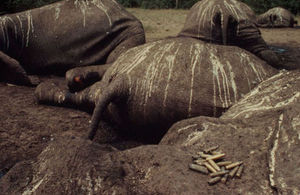World Wildlife Day
3 March is World Wildlife Day, an opportunity to highlight further issues around poaching and the Illegal Wildlife Trade.

Poached elephants
In December 2013, the UN General Assembly proclaimed 3 March as World Wildlife Day to celebrate and raise awareness of the world’s wild fauna and flora. The date coincides with the day of the adoption of the Convention on International Trade in Endangered Species of Wild Fauna and Flora (CITES).
The UK held a global Conference on the Illegal Wildlife Trade in London on 12-13 February, which agreed a set of ambitious and bold actions in the London Declaration- here Britain’s Foreign Secretary described the agreement as “a crucial turning point in our fight to save endangered species and to defeat the ruthless criminal gangs that run the illegal trade”. UK media coverage was positive and widespread examples include Guardian, BBC, Independent
Speaking about the London conference recently, British High Commissioner Dianna Melrose added:
“ The illegal wildlife trade matters to us all. It is a global criminal industry worth billions of pounds. It not only threatens the survival of some of our most iconic species, but undermines good governance and the security of fragile states; it corrupts the rule of law; supports organised crime networks; and hinders efforts to tackle long term poverty. In Tanzania as many as 30 elephants are killed every day. This is horrific and has got to be stopped. The UK will do all it can to help. We were delighted that President Kikwete announced at the London Conference that Tanzania would sign up to the Elephant Initiative and crush its ivory stockpile. This will ensure that the ivory never enters the market place, and sends a powerful message of commitment from the Government of Tanzania against poaching and the sale of ivory. We hope that the political declarations made at the London Conference will mark a turning point in the fight to end wildlife crime once and for all”.
UK Minister for Africa Mark Simmonds wrote in an op-ed in February:
“We’re facing a crisis. A rhino is killed by a poacher every ten hours and fewer than 3,500 tigers are left in the wild. This is not simply an environmental problem. With 25,000 elephants poached in 2011 and 22,000 in 2012, the illegal wildlife trade has become a global criminal enterprise, with the power and reach to halt economic development, drive conflict, sustain terrorist groups and mire the poorest people in poverty.
Poaching devastates communities across Africa, especially those parts of the continent facing the worst aspects of the poaching crisis. There is vital work going on every day across the continent to respond, from groundbreaking conservation efforts in Namibia or experiments with the latest technologies in Kenya. This work exacts a terrible toll; over 1000 park rangers have been killed in the last 10 years. Africa is leading the political response, with the steps taken at the African Elephant Summit in Botswana last December and the efforts of Gabon to raise this at the United Nations. The leadership shown by Botswana, Gabon and others is exactly what is needed to confront the problem and put an end to it.
But poaching and the illegal wildlife trade are global concerns. The illegal wildlife trade is now a serious criminal industry, worth billions, and has the potential to destabilise regions and threaten sustainable development. We must not leave Africa to face this problem, unsupported. We must all face the repercussions of wildlife crime, from money laundering to destruction of livelihoods.
The UK is committed to playing our role in helping to stop this trade and solve these issues. It is our responsibility to support the leadership that countries in Africa and elsewhere are showing on the issue. We have recently adopted a cross-government action plan to tackle the illegal wildlife trade. We have also announced new funding of £10 million for projects aimed at tackling poaching and the illegal wildlife trade and will release details soon on how we will spend these funds.”
The Prince of Wales and his son The Duke of Cambridge have also created a video urging people around the world to support organisations working to stop the illegal wildlife trade: The Prince of Wales and The Duke of Cambridge’s video
In the video Their Royal Highnesses talk about the unprecedented levels of killing of endangered species like elephants, which are killed at a rate of 100 per day. They also highlight the grave threat the illegal wildlife trade poses to the economic and political stability in many areas around the world.
During the film, The Prince of Wales says:
“We have come together, as father and son, to lend our voices to the growing global effort to combat the illegal wildlife trade - a trade that has reached such unprecedented levels of killing and related violence that it now poses a grave threat not only to the survival of some of the world’s most treasured species, but also to economic and political stability in many areas around the world.’’
The Duke of Cambridge goes on to say:
“Despite the terrible crisis that we now face, we both continue to be optimistic that the tide can be reversed. We have to be the generation that stopped the illegal wildlife trade, and secured the future of these magnificent animals, and their habitats, for if we fail, it will be too late.’’
The video ends with The Prince and The Duke saying the phrase “Let’s unite for wildlife!” in Arabic, Vietnamese, Swahili, Spanish and Mandarin in order to be understood by as many people as possible living in the countries most affected by the illegal wildlife trade.